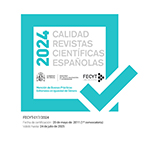La (de)colonización va por dentro: profesionales de salud mental en el trabajo con migrantes haitianos y agrupaciones de usuarios y exusuarios activistas de servicios de salud mental en Chile
Resumen
En este artículo exploramos las contradicciones y conflictos epistémicos, políticos y éticos que los profesionales de la salud mental encarnan en el trabajo tanto con migrantes haitianos como con agrupaciones de usuarios y exusuarios activistas en el contexto del sistema público de salud mental en Chile, marcado por procesos de neoliberalización durante los últimos treinta años. A partir de dos etnografías, argumentamos que el trabajo con ambos grupos interpela a los profesionales de salud mental respecto del alcance de sus disciplinas y en un plano profesional-individual. Lejos de reproducir pasivamente discursos y prácticas de dominación, los profesionales encarnan contradicciones y conflictos a partir de la incompatibilidad entre “disciplinas psi”; los conocimientos y prácticas ancladas a la medicina haitiano-creole y el vudú; y los cuestionamientos radicales a diagnósticos y tratamientos desarrollados por las agrupaciones de usuarios y exusuarios activistas. Los profesionales transforman y legitiman sus prácticas, interrogando y desafiando las concepciones universalistas de la identidad, la mente, el sufrimiento y el tratamiento. Enfatizamos que, más que un ejercicio intelectual, un llamado a la decolonización implica la politización de la práctica profesional en, o fuera de, los bordes de la psiquiatría y la salud mental en tanto sistema de gobierno.
Descargas
Descarga artículo
Licencia
La Revista de Antropología Social, para fomentar el intercambio global del conocimiento, facilita el acceso sin restricciones a sus contenidos desde el momento de su publicación en la presente edición electrónica, y por eso es una revista de acceso abierto. Los originales publicados en esta revista son propiedad de la Universidad Complutense de Madrid y es obligatorio citar su procedencia en cualquier reproducción total o parcial. Todos los contenidos se distribuyen bajo una licencia de uso y distribución Creative Commons Reconocimiento 4.0 (CC BY 4.0). Esta circunstancia ha de hacerse constar expresamente de esta forma cuando sea necesario. Puede consultar la versión informativa y el texto legal de la licencia.












